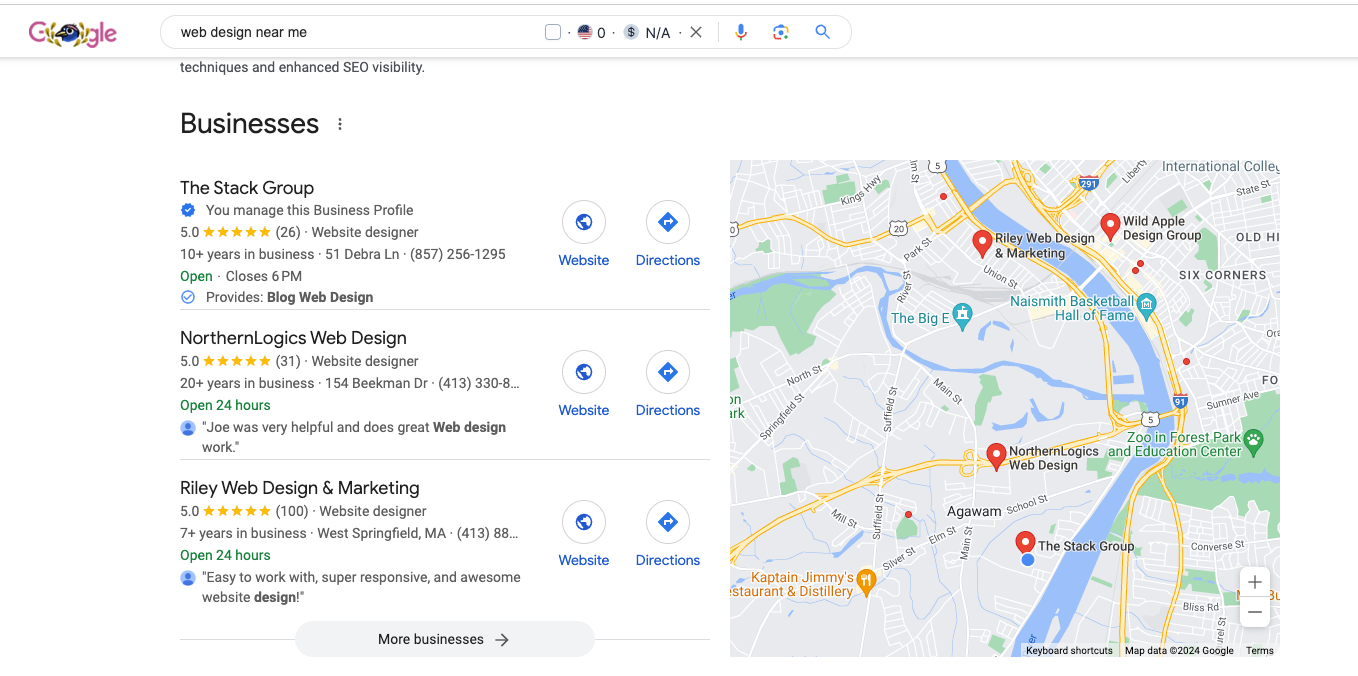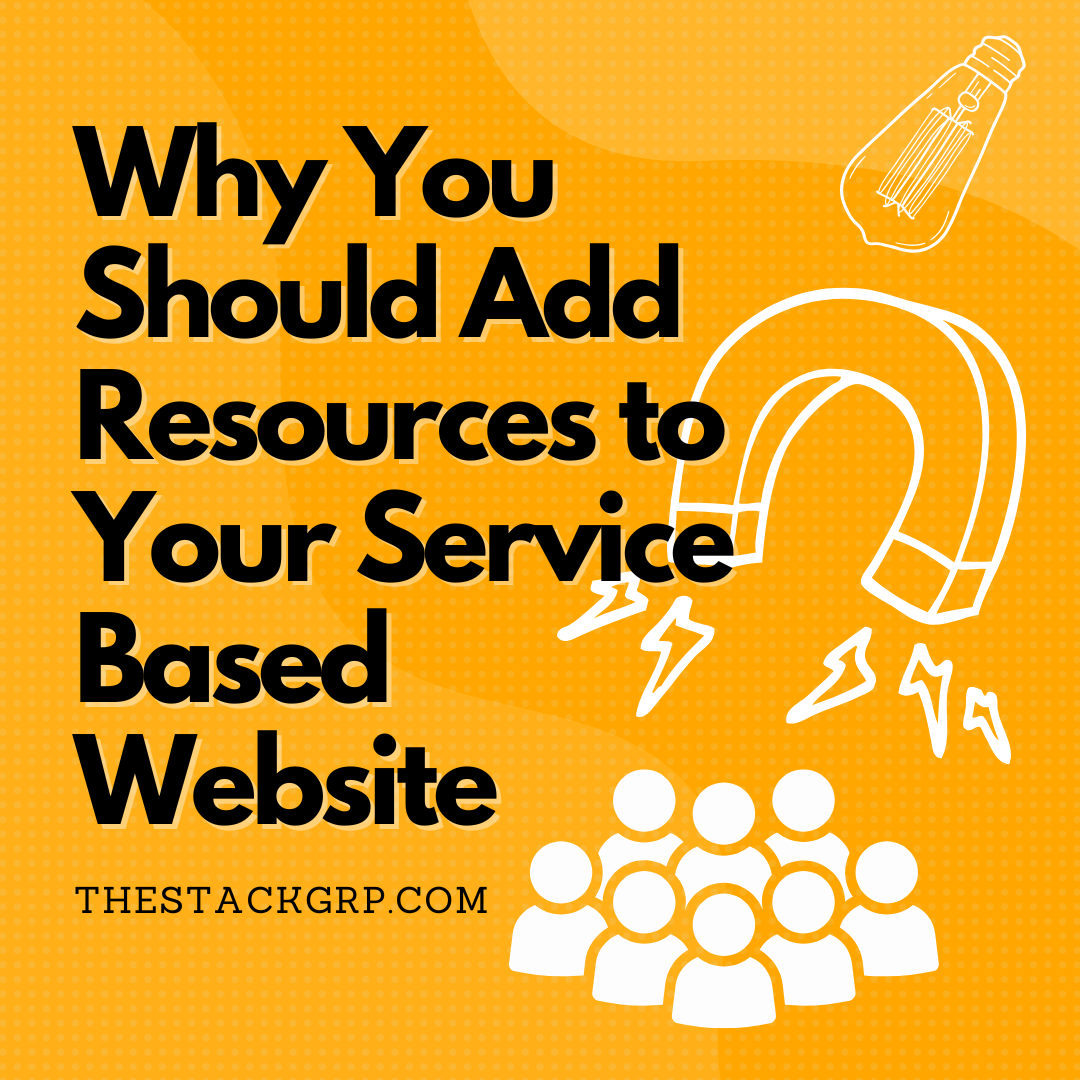Follow Us
Contact Us
How to Get Your Business Showing Up for "Near Me" Searches
In our opinion, near me searches definitely are the holy grail when it comes to local business marketing. Searches featuring the phrase "near me" are on the rise, with approximately 800 million conducted annually, reflecting their growing popularity [1]. Near me searches tend to be buying-type searches or, in the SEO world, transactional searches. It's no wonder why local companies are looking to get their website featured in these types of searches.
So what exactly are near me searches? How do you get your website appearing in the organic search results section for near me searches? What should you do and more importantly, what shouldn't you do to show up for near me searches? We'll help guide you through the answers to these questions and give you some useful tips to get your business showing up for "near me" searches.
Stuff covered in this article:
- What are local Near Me searches?
- How does Google determine local rankings?
- How to get your business showing up for near me searches
- Don'ts when it comes to near me searches
What are Near Me Searches?
Near me searches, also referred to as local intent searches, are search queries that include the phrase "near me." These types of searches typically indicate that the user is looking for a product or service in their local area. For example, someone searching for "pizza near me" may be looking for a pizza restaurant in their neighborhood. These types of searches have become increasingly popular due to the rise of mobile devices and voice search technology. People often use these searches when they are on the go and need something quickly or when they need/want services that are in their local area, like "web designer near me." These searches tend to be transactional searches which simply means that the user is ready to make a purchase or engage with a local business.

How Google Determines Local Ranking
Understanding how Google determines local rankings is crucial for any business aiming to excel in "near me" searches. Google considers three primary factors: relevance, distance, and prominence.
Relevance
Relevance refers to how well a local business listing matches the intent behind a user's search query. Google assesses the information provided in a business's profile, including its name, address, phone number, category, and description, to establish this relevance. Therefore, it’s essential for businesses to accurately represent their offerings and ensure that their information is up-to-date to improve their chances of appearing in relevant searches.
Distance
Distance plays a significant role in determining local search results. Google calculates the proximity of a business to the searcher's location when displaying results. While users typically expect to see businesses close to them, Google also takes into account the distance between the search location and the business's address.
Prominence
Prominence relates to how well-known a business is both online and offline. Google considers various factors to assess prominence, including the quantity and quality of reviews, online mentions, and backlinks from other websites. A strong online presence, characterized by positive customer reviews and reputable listings, will significantly enhance a business’s prominence and consequently, its visibility in local search results. Engaging with customers and encouraging satisfied clients to leave positive feedback can greatly improve prominence and drive local traffic.
How Do You Get Your Business Showing Up for "Near Me" Searches?
While google does not have any official - "Do This to Show Up" roadmap - they do offer tips on what you should do in order to have a high probability of showing up for near me searches. These tips are directly from Google's business profile help guide [2]:
Tip 1: Optimize Your Google Business Profile
Claim and Verify Your Business Profile:
Ensure your business is listed on Google Business Profile (GBP). If you haven’t already, claim your business listing and complete the verification process. This step is crucial as it gives you control over the information displayed about your business on Google Search and Maps.
Accurate and Complete Information:
Provide comprehensive information about your business. This includes your business name, address (very important), phone number, website, and hours of operation. Make sure all details are accurate and consistent with your other online listings to avoid confusion.
Choose the Right Categories:
Select the appropriate categories that best describe your business. This helps Google understand what your business offers and match it with relevant local searches. Be specific when choosing categories to enhance your visibility.
Add Photos and Videos:
Upload high-quality photos and videos of your business, products, and services. Visual content attracts more views and can significantly enhance customer engagement. Regularly updating your photos keeps your profile fresh and appealing.
Encourage Reviews and Respond to Them:
Positive reviews can boost your business's credibility and ranking in local searches. Encourage satisfied customers to leave reviews and ensure you respond to them promptly, addressing both positive feedback and any concerns. This interaction demonstrates that you value customer feedback and are committed to providing excellent service.
Update Your Business Information Regularly:
Keep your business information up to date, especially if there are any changes in your operating hours, services, or contact details. Regular updates help maintain accuracy and reliability, improving your business's relevance in search results.
Tip 2: Leverage Local SEO Techniques
Optimize Your Website for Local Search:
Incorporate local keywords into your website content, meta descriptions, and titles. Include your city, neighborhood, and relevant local terms to increase your chances of appearing in local searches. For example, if you’re a web designer in Hartford, use keywords like "best web designers in Hartford, CT" or target the local areas like "web designers in Hartford County."
Add Local Schema Markup
Incorporating local schema markup into your website can significantly enhance your visibility in local searches by helping search engines better understand your business. Local schema is a type of structured data that gives search engines specific information about your business, including your name, address, phone number, and operating hours.
For detailed instructions and examples on adding local schema markup, visit the Google Developers page on Local Business Structured Data. This resource provides comprehensive guidance that can help you maximize your local search visibility and improve your online presence.
Create Location-Specific Content:
Develop blog posts, landing pages, or articles focused on local events, news, or topics related to your business. This not only helps with SEO but also positions your business as an integral part of the local community. Be sure to link to those various websites in your local area as well. This all can play a role in helping Google understand your relevance to local searches.
Get Listed in Local Directories:
Ensure your business is listed in local online directories such as Yelp, Yellow Pages, and local chamber of commerce websites. Consistent and accurate listings across various platforms can enhance your local SEO efforts. Many local SEO agencies have services to help build up your directory listings as well as make sure that they are consistent and up-to-date.
Don'ts When it Comes to "Near Me" Searches
Now that we covered the basics on what to do - it's important we cover the other side of mistakes we see many companies making when it comes to optimizing for "Near Me" searches.
Don't Tip 1: Don't Near Me Keyword Your Site To Death
While we understand it seems logical to use terms like "roofer near me" or "bakery near me" or my favorite - companies that actually name their businesses names that end in Near Me (yes it really does exist - they took a page from the yellow page days where people added "A's" to their name to show up alphabetically first - brilliant minds of their time (early day hackers).
Google, remember, understands distance and the other key factors we already covered when it comes to local or near me searches. So you don't actually have to place the phrases in your site. Plus, you want specific local business typically so what good what it do you if you're a local electrician in Massachusetts and someone in California is searching for electricians near me - and perhaps they are bored and they search 200 search results down and see your website show up? Yes it's possible to show up in the black hole of search results but odds are it won't be relevant to the user.
Don't Tip 2: Don't Just Create Broad Content On Your Site
Sure it's great to create content for your site using blogs and adding additional resource pages, but create specific and relevant content. I'm sure you get 100's of emails a week telling you how they can make your website rank on Google - well friendly fact, chances are they have never even looked at your website before sending that email (they're using bots).
So instead of creating broad content like "Get the Best Roofing Services in Your Area" - create content like "5 Common Roof Problems Homeowners Face in Western MA." This not only captures local keywords but also provides valuable information for potential customers in your area.
Getting stuck or simply don't have the time to manage all of this stuff? We get it. If you have additional questions or if you're looking for an affordable SEO Agency that can help with localized SEO, reach out to our Massachusetts-based web design and SEO team. We'd be happy to provide guidance or create a custom SEO campaign to help you improve your local search rankings and attract more local customers.
Questions? Have a project you're ready to launch?
Simply text our team at
(857) 256-1295 or send us a message!
Latest Articles



SERVICES
RESOURCES
ONBOARDING

